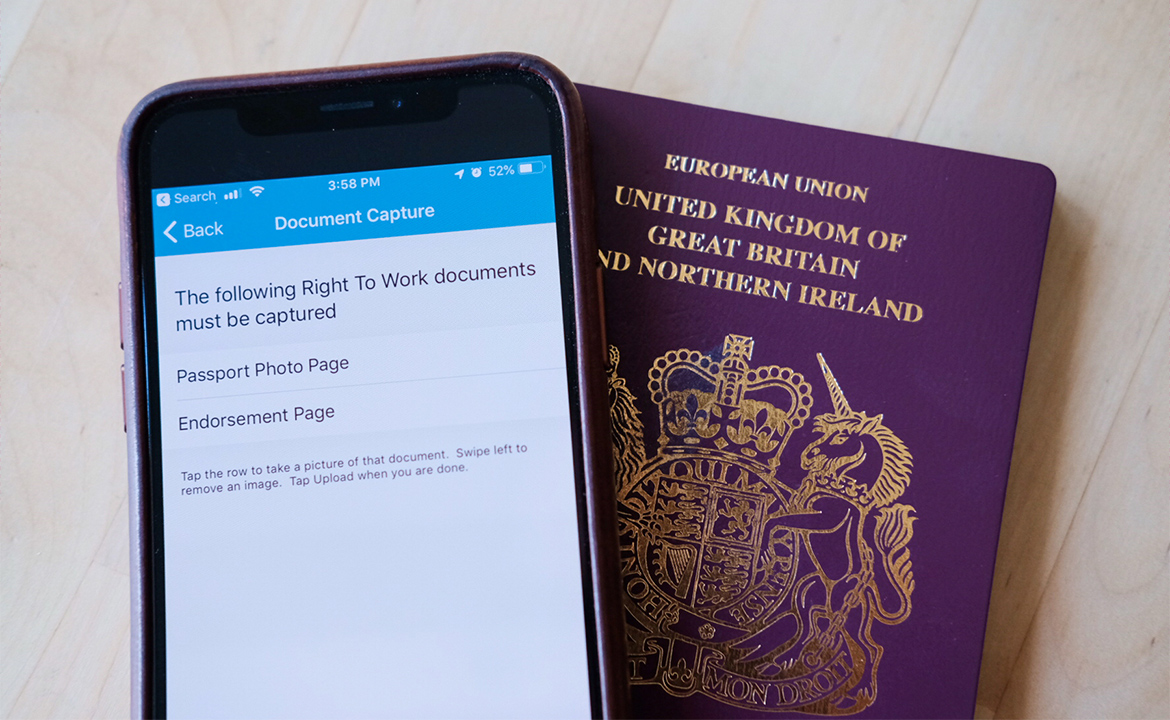Want to know more?
Are you interested in this project? Or do you have one just like it? Get in touch. We’d love to tell you more about it.
At Equal Experts we’re working on ways to use mobile to improve our own business processes, and the experiences of our employees.
The enterprise is the next frontier in the adoption of mobile devices, and it’s a trend we’ve been following to help us improve our own internal processes in light of recent changes in GDPR (General Data Protection Regulation).

It’s common practice for governments to request that people working in their country have the legal right to work there. In the UK, employers are legally obliged to check that prospective new employees have the right to work here – by taking sight of a passport or residence card.
As the Government itself advises, “if illegal workers are removed from your business, it may disrupt your operations and result in reputational damage.” Not exactly a good look – and more importantly, we want to avoid any disruption to the service we provide to our clients. So it just makes sense for us to ensure that our suppliers have a right to work here in the UK.
However, the theoretically simple act of checking this information has proven to be an administrative niggle – our teams are located in many geographic locations, on client sites, where there’s no consistent way to scan documents, or day-to-day relationship with a central ops person.
With our existing mobile devices being constant companions at work, we decided to use our in-house skills to address this clunky process via a new enterprise mobile app. The problem was a prime example of how the ubiquity of mobile devices can be harnessed to solve specific issues in the enterprise, and with the skills ready and waiting in-house? It seemed rude not to tuck into some of our own dogfood.
Our goal was to create an app that users could rely upon to guide them through the process and complete it quickly and intuitively. The whole point of the exercise was to remove any hassle, so it needed to be ‘fire and forget’ – while ensuring the personal data of those being checked was fully protected, in line with the GDPR.
The data the app works with is very much Personally Identifiable Information (PII), given we’re dealing with passport photos and info; ensuring this data is treated with the security and sensitivity it merits was a key objective.
Furthermore, our research showed that those who carried out the task would be keen to use their phones over the previous process. They’d previously used their phones to assist in the task, in keeping with a broader trend of people happily using their own mobile devices to assist them in work-related activities.
This ‘shadow IT’ can in itself be an issue for organisations, as these devices and apps operate outside the bounds of an enterprise’s policies. With this in mind – and the aforementioned arrival of GDPR – developing our own enterprise app became the logical solution.
Further investigations led us to conclude:
To execute the idea, our small team called on a range of the skills already within our network. A rough prototype was quickly put together to confirm we were on the right track, with input from design and UX practitioners, as well as our future users, refining the design further.
Within just four weeks of iterative development, we had our iOS app ready to go. We’ve already had great feedback: “It’s a really good process, straightforward and easy to use, with no extra work to be done afterwards.” A clear step up from the process we had before, the app’s turned an onerous chore into something that just gets done – quickly.
As in our individual lives, where mobile devices and apps like Google Maps, AirBnB, Uber etc. have changed the way we interact with the world, it seems our work will also benefit – with ease of use and scale of mobility changing the way we work for the better.
Are you interested in this project? Or do you have one just like it? Get in touch. We’d love to tell you more about it.